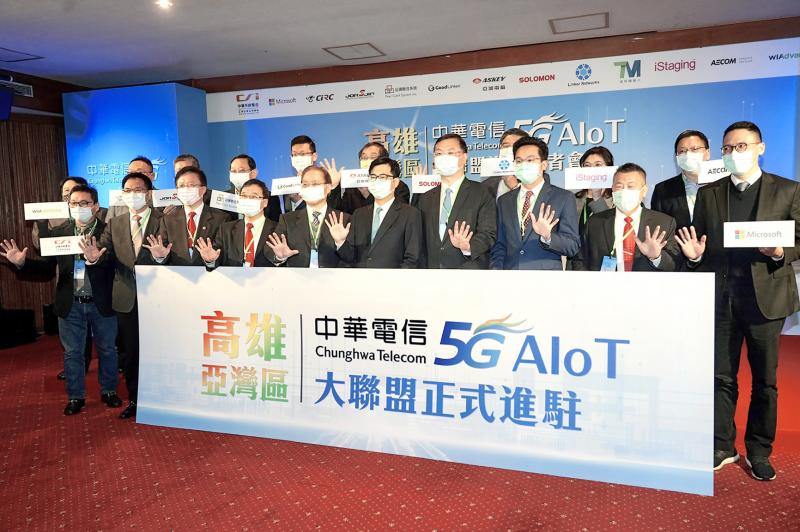Chunghwa Telecom Co (CHT, 中華電信) yesterday announced a NT$300 million (US$10.53 million) investment in Kaohsiung’s Asia New Bay Area (亞洲新灣區) along with 13 corporate partners to build information and communications technology (ICT), and 5G infrastructure in the area.
The investment is also aimed at developing new applications for 5G as part of the 5G AIoT (artificial intelligence of things) International Alliance, which the Kaohsiung City Government initiated on Nov. 30 last year, comprising the city government, some central government agencies, technology companies and telecoms.
Chunghwa Telecom was the first among the nation’s telecoms to obtain a 5G license from the government. It launched its 5G services on July 1 last year.

Photo: CNA
Chunghwa Telecom chairman Sheih Chi-mau (謝繼茂) told a news conference in Kaohsiung that its new investment would create more than 500 jobs over the next three years.
The project is a key part of Kaohsiung’s digital transition and would “let the world see Taiwan’s 5G capabilities,” Sheih said.
According to the company’s plan, Chunghwa Telecom would build a fiber-optic network in the Asia New Bay Area, construct cloud servers and create a 5G private network in the next three years.
The area would be a testing ground for new 5G applications, such as smart manufacturing, artificial reality/virtual reality, drone deliveries and other new applications, the company said.
Kaohsiung Mayor Chen Chi-mai (陳其邁) said that Chunghwa Telecom’s expertise with ICT would help Kaohsiung maximize its metropolitan capability.
“We hope Chunghwa Telecom will help push Kaohsiung’s digital transition and diversified industrial development forward, and accelerate the city’s development toward becoming a 5G smart port city,” Chen said.
Chunghwa Telecom’s 13 corporate partners include Microsoft Corp, Coretronic Corp (中光電), Jorjin Technologies Inc (佐臻), GoodLinker Co (谷林運算), Askey Computer Corp (亞旭電腦), Linker Networks Inc (寶蘊凌科), Techman Robot (達明機器人), iStaging Corp (愛實境) and WiAdvance Technology Co (緯謙科技).

‘SWASTICAR’: Tesla CEO Elon Musk’s close association with Donald Trump has prompted opponents to brand him a ‘Nazi’ and resulted in a dramatic drop in sales Demonstrators descended on Tesla Inc dealerships across the US, and in Europe and Canada on Saturday to protest company chief Elon Musk, who has amassed extraordinary power as a top adviser to US President Donald Trump. Waving signs with messages such as “Musk is stealing our money” and “Reclaim our country,” the protests largely took place peacefully following fiery episodes of vandalism on Tesla vehicles, dealerships and other facilities in recent weeks that US officials have denounced as terrorism. Hundreds rallied on Saturday outside the Tesla dealership in Manhattan. Some blasted Musk, the world’s richest man, while others demanded the shuttering of his

ADVERSARIES: The new list includes 11 entities in China and one in Taiwan, which is a local branch of Chinese cloud computing firm Inspur Group The US added dozens of entities to a trade blacklist on Tuesday, the US Department of Commerce said, in part to disrupt Beijing’s artificial intelligence (AI) and advanced computing capabilities. The action affects 80 entities from countries including China, the United Arab Emirates and Iran, with the commerce department citing their “activities contrary to US national security and foreign policy.” Those added to the “entity list” are restricted from obtaining US items and technologies without government authorization. “We will not allow adversaries to exploit American technology to bolster their own militaries and threaten American lives,” US Secretary of Commerce Howard Lutnick said. The entities

Minister of Finance Chuang Tsui-yun (莊翠雲) yesterday told lawmakers that she “would not speculate,” but a “response plan” has been prepared in case Taiwan is targeted by US President Donald Trump’s reciprocal tariffs, which are to be announced on Wednesday next week. The Trump administration, including US Secretary of the Treasury Scott Bessent, has said that much of the proposed reciprocal tariffs would focus on the 15 countries that have the highest trade surpluses with the US. Bessent has referred to those countries as the “dirty 15,” but has not named them. Last year, Taiwan’s US$73.9 billion trade surplus with the US

Prices of gasoline and diesel products at domestic gas stations are to fall NT$0.2 and NT$0.1 per liter respectively this week, even though international crude oil prices rose last week, CPC Corp, Taiwan (台灣中油) and Formosa Petrochemical Corp (台塑石化) said yesterday. International crude oil prices continued rising last week, as the US Energy Information Administration reported a larger-than-expected drop in US commercial crude oil inventories, CPC said in a statement. Based on the company’s floating oil price formula, the cost of crude oil rose 2.38 percent last week from a week earlier, it said. News that US President Donald Trump plans a “secondary